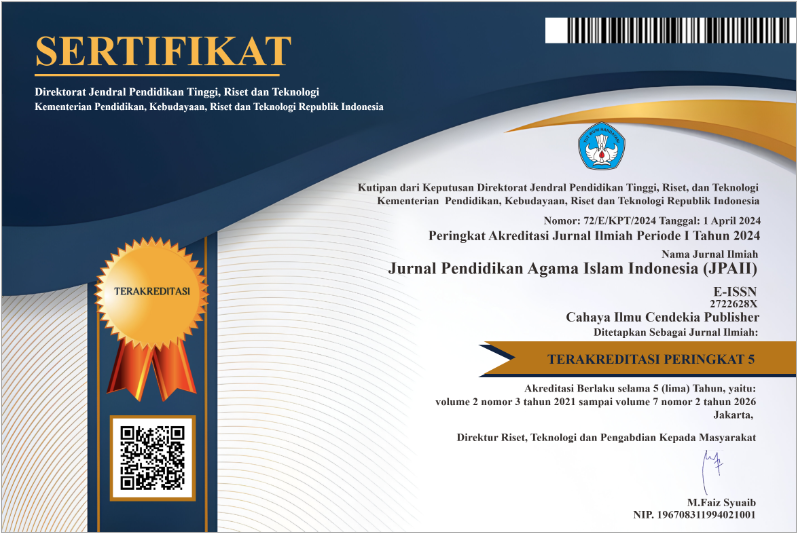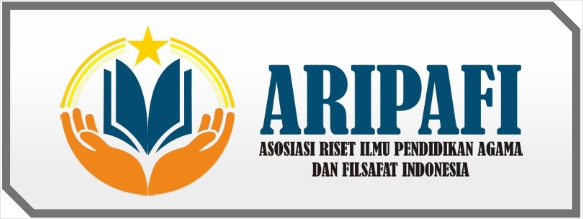Improving the Quality of Islamic Religious Education Learning through Religious Extracurricular Activities
Abstract
Purpose of the study: To find out the implementation of religious extracurricular activities in improving the quality of the Islamic religious education learning process, to find out the obstacles faced in the implementation of religious extracurricular activities in improving the quality of the Islamic religious education learning process and to find out the efforts or solutions made by instructors in overcoming the obstacles faced in the implementation of religious extracurricular activities.
Methodology: This type of research is descriptive research. The approach used in this research is to use a qualitative approach. The approach techniques used in this thesis are the pedagogical approach and the management approach.
Main Findings: Implementation of religious extracurricular activities, namely reading and writing the Qur'an, lecture or speech training, dhikr together. Obstacles faced in the implementation of extracurricular activities are that 80% of students are unable to read the Qur'an due to lack of motivation and participation from parents of students, in addition students also have a lack of understanding of religion. The solution taken by the school in overcoming obstacles to the implementation of religious extracurricular activities is that student grades are postponed by Islamic religious teachers until students are able to read the Qur'an, Islamic religious teachers write letters to parents of students, practice lectures or speeches, get students used to praying in congregation at the mosque, participate in dhikr activities together every Friday night at the State Senior High School 2 Palopo Mosque
Novelty/Originality of this study: This study has the potential to show that the integration of religious activities outside the classroom can enrich students' learning experiences, strengthen understanding of religious values, and support the formation of holistic Islamic character.
References
J. Filgona, J. Sakiyo, D. M. Gwany, and A. U. Okoronka, “Motivation in Learning,” Asian J. Educ. Soc. Stud., vol. 10, no. 4, pp. 16–37, 2020, doi: 10.9734/ajess/2020/v10i430273.
R. L. Gaol and A. Sitepu, “The Influence of Used Good-Based Learning Media on the Value of Chracter Education and Student’s Motivation to Study,” Budapest Int. Res. Critics Linguist. Educ. J., vol. 3, no. 4, pp. 1696–1703, 2020, doi: 10.33258/birle.v3i4.1299.
H. Alamri, V. Lowell, W. Watson, and S. L. Watson, “Using personalized learning as an instructional approach to motivate learners in online higher education: Learner self-determination and intrinsic motivation,” J. Res. Technol. Educ., vol. 52, no. 3, pp. 322–352, 2020, doi: 10.1080/15391523.2020.1728449.
S. Hertel and Y. Karlen, “Implicit theories of self‐regulated learning: Interplay with students’ achievement goals, learning strategies, and metacognition,” Br. J. Educ. Psychol., vol. 91, no. 3, pp. 972–996, 2021. doi: 10.1111/bjep.12402
S. Supriyanto, A. Amrin, and A. A. Rifa’i, “Islamic Education Paradigm on Religious Understanding in Indonesia (A Case Study at Islamic Boarding School of Al-Muayyad Surakarta),” Akad. J. Pemikir. Islam, vol. 27, no. 1, pp. 31–46, 2022. doi: 10.32332/akademika.v27i1.4562
W. Wantini, S. Sulastri, and K. N. L. Mahmudah, “Review of Islamic Psychology: Building Correlations of Religious Maturity in Islamic Education,” Psikis J. Psikol. Islam., vol. 10, no. 1, pp. 59–68, 2024. doi: 10.19109/psikis.v10i1.13232
S. Wahyuni and S. Bhattacharya, “Strategy of Islamic Religious Education Teachers in Increasing Student Learning Motivation,” Tafkir Interdiscip. J. Islam. Educ., vol. 2, no. 2, pp. 229–249, 2021. doi: 10.31538/tijie.v2i2.22
E. Khaidir and F. M. Suud, “Islamic education in forming students’ characters at as-shofa Islamic High School, pekanbaru Riau,” Int. J. Islam. Educ. Psychol., vol. 1, no. 1, pp. 50–63, 2020. doi: 10.18196/ijiep.1105
A. Adiyono, A. Fadhilatunnisa, N. A. Rahmat, and N. Munawarroh, “Skills of Islamic Religious Education Teachers in Class Management,” Al-Hayat J. Islam. Educ., vol. 6, no. 1, pp. 104–115, 2022. doi: 10.35723/ajie.v6i1.229
S. Suparjo, M. Hanif, and D. I. Senja, “Developing Islamic science based integrated teaching materials for Islamic religious education in Islamic high schools,” Pegem J. Educ. Instr., vol. 11, no. 4, pp. 282–289, 2021. doi: 10.47750/pegegog.11.04.27
S. Adhi, D. Achmad, and S. Herminarto, “Developing a blended learning model in islamic religious education to improve learning outcomes,” Int. J. Inf. Educ. Technol., vol. 12, no. 2, pp. 100–107, 2022. doi: 10.18178/ijiet.2022.12.2.1592
S. R. Laili, T. Supriyatno, and A. Gafur, “Development of Islamic Religious Education Teacher Competency and Character Through Blended Learning,” Nazhruna J. Pendidik. Islam, vol. 5, no. 2, pp. 864–875, 2022. doi: 10.31538/nzh.v5i2.2359
M. H. Tuna, “The professionalisation of Islamic religious education teachers,” Br. J. Relig. Educ., vol. 44, no. 2, pp. 188–199, 2022. doi: 10.1080/01416200.2021.1999905
Z. Muzakki and N. Nurdin, “Formation of Student Character in Islamic Religious Education,” EDUKASIA J. Pendidik. Dan Pembelajaran, vol. 3, no. 3, pp. 937–948, 2022. doi: 10.62775/edukasia.v3i3.219
D. Darlan, S. S. Pettalongi, and R. Rustina, “The roles of Islamic education in building students’ character within Indonesia public schools,” Int. J. Contemp. Islam. Educ., vol. 3, no. 2, pp. 21–39, 2021. doi: 10.24239/ijcied.Vol3.Iss2.37
M. Taufik, “Strategic role of Islamic religious education in strengthening character education in the era of industrial revolution 4.0,” J. Ilm. Islam Futur., vol. 20, no. 1, pp. 86–104, 2020. doi: 10.22373/jiif.v20i1.5797
A. Saraya, A. Mardhatillah, E. N. Fitriani, and A. Adiyono, “The Role Of Islamic Religious Education Teachers: Problems In Evaluating Student Learning Outcomes In Junior High Schools,” Dharmas Educ. J., vol. 4, no. 2, pp. 565–572, 2023. doi: 10.56667/dejournal.v4i2.1060
H. S. R. N. binti Haji and F. Ulfah, “Contribution of Religious Leaders in Behavioral Education in Adolescents,” Focus (Madison)., vol. 4, no. 1, pp. 1–12, 2023. doi: 10.26593/focus.v4i1.6488
Z. Zuhaeriah, M. Ali, and Y. Yusra, “The role of islamic education teachers competency in improving the quality of education,” Int. J. Contemp. Islam. Educ., vol. 2, no. 1, pp. 108–130, 2020. doi: 10.24239/ijcied.Vol2.Iss1.15
F. A. Fauzan and M. Fikri, “The Creativity of Islamic Religious Education Teachers for Effective Learning,” J. Inov. Pendidik. Agama Islam, vol. 2, no. 2, 2022. doi: 10.15575/jipai.v2i2.18196
Y. S. Aminah, “Various Extracurricular Activities as a Medium of Development of Multiple Intelligences,” Int. J. Multicult. Multireligious Underst., vol. 8, no. 5, pp. 738–746, 2021. doi: 10.18415/ijmmu.v8i5.2512
S. Aisyah, M. T. B. Kejora, and A. Akil, “The influence of religion in intra-school student organizations on the character building of students at Proklamasi vocational high school in Karawang,” J. Pendidik. Tambusai, vol. 5, no. 2, pp. 3764–3771, 2021. https://jptam.org/index.php/jptam/article/view/1466
H. Fakhrurrozi, M. Minabari, F. Saguni, and S. Nadirah, “Integration of Islamic Education Curriculum to Enhance the Social Character of Vocational High School Students,” Ta’dib, vol. 26, no. 1, p. 171, 2023, doi: 10.31958/jt.v26i1.7237.
V. A. Saharan, H. Kulhari, H. Jadhav, D. Pooja, S. Banerjee, and A. Singh, “Introduction to research methodology,” in Principles of Research Methodology and Ethics in Pharmaceutical Sciences, CRC Press, 2020, pp. 1–46. doi: 10.1201/9781003088226-1
S. Campbell et al., “Purposive sampling: complex or simple? Research case examples,” J. Res. Nurs., vol. 25, no. 8, pp. 652–661, 2020. doi: 10.1177/1744987120927206
E. Y. Khalefa and S. N. Selian, “Non-random samples as a data collection tool in qualitative art-related studies,” Int. J. Creat. Arts Stud., vol. 8, no. 1, pp. 35–49, 2021. https://www.academia.edu/download/106836009/2208.pdf
A. Kamal, M. Ahmadun, N. Hasan, and N. F. G. Ahmad, “Methodology of Informant Determination for the Elderly Micro Takaful Study,” Int. J. Acad. Reserach Econ. Manag. Sci., vol. 12, no. 2, 2023. https://knowledgewords.com/index.php/ijarems/article/view/852
A. Barney, S. Buckelew, V. Mesheriakova, and M. Raymond-Flesch, “The COVID-19 pandemic and rapid implementation of adolescent and young adult telemedicine: challenges and opportunities for innovation,” J. Adolesc. Heal., vol. 67, no. 2, pp. 164–171, 2020. doi: 10.1016/j.jadohealth.2020.05.006
S. Y. S. S. Y. Shin and S. M. S. Miller, “A review of the participant observation method in journalism: Designing and reporting,” Rev. Commun. Res., vol. 10, 2022. https://www.rcommunicationr.org/index.php/rcr/article/view/12
E. A. Mezmir, “Qualitative Data Analysis: An Overview of Data Reduction, Data Display and Interpretation,” Res. Humanit. Soc. Sci., vol. 10, no. 21, pp. 15–27, 2020, doi: 10.7176/rhss/10-21-02.
I. Tabroni and A. M. Romdhon, “The Influence of Islamic Religious Education on the Student’s Conduct,” J. Multidisiplin Madani, vol. 2, no. 2, pp. 787–794, 2022. https://journal.formosapublisher.org/index.php/mudima/article/view/172
F. Zahira, A. S. Hamida, A. S. Tsabit, N. N. Fauzia, R. Romadhoni, and F. Hidayat, “Islamic Moral Education in Shaping the Character of Muslim Identity in the Millennial Era,” Solo Univers. J. Islam. Educ. Multicult., vol. 2, no. 02, pp. 103–118, 2024. doi: 10.61455/sujiem.v2i02.157
Copyright (c) 2024 Hasbar Hasbar, Misbahullah Misbahullah, Ahmad Ghiyats Fawwaz

This work is licensed under a Creative Commons Attribution 4.0 International License.
Authors who publish with this journal agree to the following terms:
- Authors retain copyright and acknowledge that the Jurnal Pendidikan Agama Islam Indonesia (JPAII) is the first publisher licensed under a Creative Commons Attribution 4.0 International License.
- Authors are able to enter into separate, additional contractual arrangements for the non-exclusive distribution of the journal's published version of the work (e.g., post it to an institutional repository or publish it in a book), with an acknowledgment of its initial publication in this journal.
- Authors are permitted and encouraged to post their work online (e.g., in institutional repositories or on their website) prior to and during the submission process, as it can lead to productive exchanges and earlier and greater citation of published work.







.png)
.png)





















